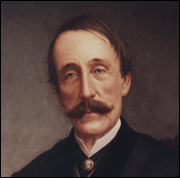Henry Bergh: 'The great meddler'
The Unitarian who founded societies for the prevention of cruelty to animals and children.
That unpromising encounter launched two intertwined North American social movements: prevention of cruelty to animals and to children. Nothing in Bergh’s early life presaged his call to compassion. A dilettante playwright with no children or pets, he once explained to a friend that he disliked her canine not because the dog was small, but because the dog was a dog. Yet in his early fifties, while serving as President Lincoln’s envoy to Czar Alexander II in 1863, Bergh witnessed cruelties in the streets of St. Petersburg that awoke his humane impulse. He resigned his diplomatic post in Russia to study England’s Royal Society for the Prevention of Cruelty to Animals—founded after Unitarian legal scholar Jeremy Bentham asserted that the moral “question is not, Can [animals] reason? nor, Can they talk? but, Can they suffer?”
So Bergh commenced his life work not from an affinity with animals, nor as a squeamish sentimentalist, but stirred by suffering and injustice. “This is a matter purely of conscience,” he said. “It has no perplexing side issues. . . . It is a moral question in all its aspects.” Unitarian newspaper magnate Horace Greely and seventy other prominent citizens signed Bergh’s “A Declaration of the Rights of Animals.” The Albany legislature passed an animal welfare statute in response, also chartering the continent’s first humane organization: the American Society for the Prevention of Cruelty to Animals. Bergh’s minister Henry Whitney Bellows (of what is now Manhattan’s Unitarian Church of All Souls) served as one of the ASPCA’s first vice-presidents, urging “zeal and . . . fearless arrests.” Some newspapers labeled Bergh “the Great Meddler”; others, “An Ass That Should Have His Ears Cropped.”
Bergh broadcasted that all animals fell under the Society’s purview. Battles between Bergh and Universalist circus showman P.T. Barnum became legendary. Yet Bergh more typically targeted routine practices of the day: butchers who bound calves’ legs and stacked the live animals like cordwood for transport over cobblestone streets, or who plucked and boiled chickens alive; sea captains who punched holes in turtles’ flippers, strung the creatures together with twine, then shipped them upside-down for weeks without food or water; dairymen who permanently chained cows to their stalls; and well-to-do gentlemen who shot pigeons for sport.
Bergh’s industriousness knew few bounds. He developed slings for injured horses and clay pigeons for shooting matches. Uninvited, he waded into legislatures in white spats and slaughterhouses in rubber boots. Criticized for tending animals rather than people, he replied that if animals had to await mercy until human affairs were resolved, they would still be waiting at the Second Coming.
In 1874, Bergh learned of a nine-year-old girl beaten daily by her stepmother. No person or agency would intervene in a family matter. Bergh not only effected Mary Ellen’s rescue, but developed the first U.S. law shielding children from domestic abuse. He called for a Society for the Prevention of Cruelty to Children; when no one replied, he created it himself. Newspapers called his innovation “preposterous,” under headlines like “Legislation Running Mad!” and “Leave Our Children Alone!” But Bergh’s previous anti-cruelty work accustomed him to death threats, public ridicule, and physical attacks. Top hat firmly in place, he employed his jaunty cane in self-defense when necessary, remaining ASPCA president and SPCC board member until his death in 1888. By that time, his societies had prosecuted over 12,000 cruelty cases.
Long before Bergh’s funeral, his city and nation had claimed him as hero. “It may almost be said of Henry Bergh that he has invented a new type of goodness,” Scribner’s Magazine proclaimed in 1879, “since invention is only the perception and application of truths that are eternal.” Many Unitarians supported Bergh’s work during his lifetime, including essayist Ralph Waldo Emerson and Little Women author Louisa May Alcott. Unitarian and Universalist churches helped found myriad U.S. and Canadian humane societies. Unitarian poet Henry Wadsworth Longfellow eulogized Bergh as “among the noblest of the land . . . The friend of every friendless beast.” Barnum, won to what he called Bergh’s “excellent cause,” was one of Bergh’s pallbearers. The “Great Meddler” had persuaded his contemporaries of what we need to relearn in every age: We have not arrived at the end of moral history, but stand in its very midst.
See sidebar for links to related resources.
Comments powered by Disqus







